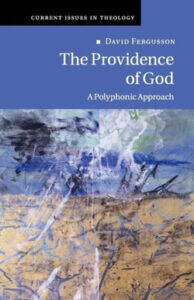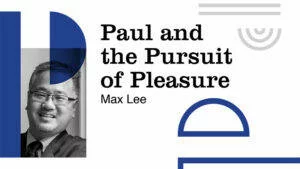David Fergusson’s The Providence of God: A Polyphonic Approach is an important recent contribution to studies of the doctrine of providence and divine action, and I am grateful for the opportunity to engage a little with it in a public forum. In this essay, I will focus on Professor Fergusson’s reshaping of double agency and the threefold form of providence as sketched in his excursus on divine action (pp. 217–240). I shall conclude by posing three sets of questions that I hope advance the conversation in some way, even if only by a degree or two.
On reading The Providence of God, I was especially impressed by Professor Fergusson’s commitment to a theology of providence that recognizes the diversity of divine actions as attested in Scripture and in Christian life and worship. These all portray God “as variously determining, interacting, permitting and improvising” (p. 11), as “blessing, guiding, ruling, forgiving” (p. 298), and so on. Such an approach suggests a genuinely free and open relationship between God and the world, for each kind of divine action is framed on its own terms in relation to free human actions and not absorbed by a broader schema. Accordingly, there is no longer a need to systematize divine action, nor a reason ultimately to conceive providence as anything other than God’s eschatological activity by which God the Holy Spirit directs creation in countless ways through Jesus Christ to its promised consummation.
Double Agency
However, this does not mean that past treatments of providence should be rejected; Professor Fergusson is clear from the outset that The Providence of God is a work of “criticism and recovery” (p. 11; cf. 302). Of particular interest to me in this respect is his interpretation of double agency. Classically, double agency posits God acting as first or primary cause in and through a universe of creaturely secondary causes. Although many have criticized double agency for at least its tendency toward a strict divine determinism that renders the freedom and causal integrity of creatures (read: humans) suspect, Professor Fergusson recognizes that the notion’s strength lies in its honorable intent to affirm genuine creaturely causal integrity alongside God’s unceasing activity and sovereign authority in a world that appears closed to accommodating divine action. So despite his own critique of double agency as typically conceived (pp. 226–228), Professor Fergusson is keen not to abandon the concept altogether.
Professor Fergusson’s rehabilitation of double agency depends on the legitimacy of construing divine agency analogously in terms of human agency. Human agents act intentionally and purposefully in sets of free and often loving relationships, and there is no reason to suppose that God cannot be regarded similarly so long as the appropriate conceptual adjustments are made to account for the fundamental ontological distinction between God and creation. When this happens, God can be thought of as “an absolute agency that supervenes upon the world” (p. 230), an agent who works intentionally and purposefully “in, with and through” all things (p. 231). This take upholds creaturely causal integrity even while affirming God’s sovereignly active presence at all times and in all places. But—and here is the subtle but significant difference in emphasis between Professor Fergusson’s appropriation of double agency and the classical position—this does not mean that God’s agency should be equated simply and uncritically with everything that happens, for God is not so much the primary cause operating through secondary causes as a persistent presence manifesting “the divine commitment to work graciously in each and every circumstance” (p. 231). Thus “divine double agency”—which I presume refers to the action of God’s “two hands,” God’s Word and Spirit (cf. pp. 229, 232)—“is more about the universality and faithfulness of God than the determination of everything that happens” (p. 232). The implication here is that the triune God of Christian confession is perceived as acting constantly, pervasively, and variously to bring about the purposes God has promised for the world. There is double agency, but it is not necessary to understand this double agency deterministically in terms of primary and secondary causation.
Threefold Form
This approach affects at least one other aspect of a more traditionally framed doctrine of providence: its so-called threefold form. On this account,The incarnation and resurrection of Jesus, and the church’s receipt of the Spirit, are extraordinary and decisive divine actions heralding the eschatological transformation of all things. But such an end cannot be read off the pages of history. God preserves the universe in existence, accompanies or concurs in all that transpires, and governs or directs all things to their appointed end. As with divine agency, Professor Fergusson does not intend to discard this threefold form, but he is aware it needs remodeling so that it is more obviously compatible with the vision of double agency he has cast. First, God has created a universe which develops according to its divinely granted evolutionary processes, meaning that its preservation is primarily (solely?) a matter of God’s faithfulness to maintain it in its existence. Second, divine concurrence is depicted as God’s presence in, with, and through all things by the Holy Spirit, though this in no way entails that God determines or approves of whatever happens. Instead, “God strives to generate intended outcomes within material and social processes” (p. 237). And third, God’s directing of the world is defined fundamentally by God’s action distinctively in the incarnate Jesus and in the Spirit-filled church. The incarnation and resurrection of Jesus, and the church’s receipt of the Spirit, are extraordinary and decisive divine actions heralding the eschatological transformation of all things. But such an end cannot be read off the pages of history. It is rather a commitment of faith to discern that “God works paradigmatically in and through the events of nature and history” (p. 240) in diverse ways.
Three Sets of Questions
I appreciate Professor Fergusson’s instinct to reclaim double agency and the threefold form of providence from the miry clay of determinism, but his proposals do raise three sets of questions for me. First of all: given Professor Fergusson’sI appreciate Professor Fergusson’s instinct to reclaim double agency and the threefold form of providence from the miry clay of determinism, but his proposals do raise three sets of questions for me. insistence that the plurality of God’s acts in Scripture and in Christian life and worship should more deliberately shape our ideas about providence and divine action; and given his later observation that providence is best conceived “adverbially or adjectivally” (p. 298), that is, as a qualitative description of God’s actions; does this mean that what is known traditionally as the doctrine of providence should be replaced by a theology of providence discernible within and across all the other Christian doctrines? And does this mean that there is no further need for a doctrine of providence?
My second set of questions relates to Professor Fergusson’s account of double agency. He is right, I think, to eschew deterministic construals of the divine–human relation as exemplified in traditional accounts of primary and secondary causation, and I appreciate his reinterpretation of double agency as testimony to God’s active, non-deterministic presence in everything that happens. But is it necessary to deploy the specific terminology of “double agency” to achieve the results he intends? As it is already clear from the pages of Scripture and from Christian experience that God is an agent acting in, with, through, and against other (human) agents, it seems unnecessary to go beyond these interactions and depict them explicitly in terms of double agency. Moreover, it seems to me that the language of double agency could depersonalize particular human beings by casting humanity en masse as one of the two agents implied by “double agency.” There is also a question, I think, about how “agency” applies to non-human creatures and inanimate objects to and in which God is presumably present as agent—or does “double agency” apply strictly to divine–human relations?
Perhaps disingenuously, my third and final set of questions does not arise from Professor Fergusson’s statements on double agency or the threefold form of providence, but from what might be called the underlying Trinitarian “grammar” of his overall position. Professor Fergusson is correct to recognize that divine action and providence relate specifically to the action of the triune God; and he is persuasive in suggesting that providence is “a dispersed notion . . . [that] attaches in different ways to each of the three articles of faith” (p. 297). This implies, at least to me, that all the divine actions relayed by the ecumenical creeds—making, begetting, giving life, and so on—should be taken seriously as specific divine actions. But Professor Fergusson goes on to advise that providence “needs to be variously appropriated to Father, Son and Spirit” (p. 297). I am not entirely sure what is being proposed here. Is it intended that, for example, certain actions (e.g., making or creating) are assigned to the Father, others (e.g., dying) to the Son, and still others (e.g., giving life) to the Spirit? Or is it that each aspect of the threefold form of providence should connect to one of the divine persons, so that, for example, preservation relates to the Father, concurrence to the Son, and direction to the Spirit? The problem with both of these approaches is that each could introduce an imbalance to the doctrine or theology of providence whereby one divine person is elevated or prioritized apart from the other two. What roles, for example, do the Son and the Spirit play in the various divine actions constituting the world’s preservation if this is appropriated to the Father? My instinct here is to avoid explicating providence in terms of appropriating certain divine actions to specific divine persons, but to emphasize instead the action of the triune God working in each and every situation regardless of where those actions appear in the creedal articles.
Once more, I am grateful for the opportunity to engage with The Providence of God, and I hope it is clear that my three sets of questions stem from my appreciation of Professor Fergusson’s monograph.








Comments
Be the first one to make a comment!